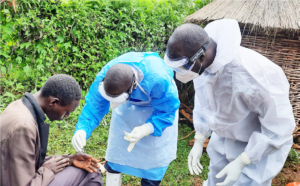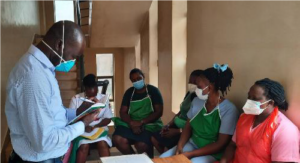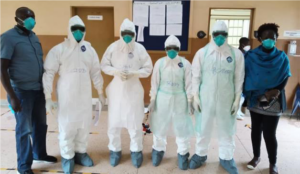 |
Job MorukilengAdvanced Field Epidemiology (UPHFP), MPH Host Site:Ministry of Health
|
|||
ABOUT THE FELLOWJob holds a Master of Public Health Degree from Makerere University College of Health Sciences, School of Public Health. Before joining the fellowship programme, he worked with International Rescue Committee (IRC) and Baylor College of Medicine Children’s Foundation where he managed and implemented public health projects focusing on improving maternal and child health (MCH), HIV and malaria in Teso and conflict affected Karamoja region in Uganda. During his involvement in public health project management and implementation, he realized gaps in his capacity to investigate and provide evidence-based recommendations to the public health problems that significantly affected the communities he was serving (such as outbreaks, side effects of MCH project services like family planning and immunization). To address this gap, he joined the Public Health Fellowship Programme (PHFP). During the two years of the fellowship, Job has appreciated the role of several statistical methods and research designs in field epidemiology and public health. He has gained skills in managing research projects, developing policy briefs, collecting data, managing and analyzing data (Epi info, STATA, SPSS), mapping (QGIS), scientific writing, and report writing. He has written manuscripts, published bulletin articles, led outbreak investigations and implemented a quality of care improvement project Achievements at the Host SiteThe Reproductive Health Division (RHD) is one of the divisions under the Maternal and Child Health (MCH) department of Ministry of Health, Uganda. RHD covers antenatal care, family planning, emergency obstetric care, neonatal care and cancer of the cervix. The mandate of RHD is to guide planning, standardization, implementation, monitoring and evaluation of RH services provided by the government, nongovernmental organizations (NGOs), faith-based organizations (FBOs), community-based organizations (CBOs), private for-profit sectors and communities in Uganda. Several policies and legal frameworks obligate the Government of Uganda to enhance the Reproductive Health (RH) status of all Ugandans by increasing equitable access to RH services and by improving the quality, efficiency and effectiveness of the services at all levels. To support the role of the reproductive health division, I was involved in the following:
Fellowship program specific achievementsAchievements
Co-investigated the following outbreaks
Other epidemiological studies and response activities
Summary of Epidemiological Study:Title: The Epidemiological study was titled ‘Knowledge, Attitudes, and Practices of Adult Refugees towards COVID-19, Nakivale Refugee Settlement, Uganda, July 2020’ was inspired by the COVID-19 contact tracing, quarantine and risk mapping activities that I participated in during the initial phase of COVID-19 outbreak. The abstract of the study is summarised below. Background: Nakivale Refugee Settlement (NRS) in Uganda is home to >130,000 refugees from several countries in the surrounding region. Beyond living in settings with high risk of outbreaks due to crowding and poor living conditions, refugees have limited access to health information given competing priorities and language barriers. On 20 April 2020, the first COVID-19 case in NRS was reported. We assessed knowledge, attitudes, and practices about COVID-19 among refugees in NRS to inform appropriate control interventions. Methods: From 20 July–1 August 2020, we conducted a cross-sectional survey among refugees from randomly-selected households in NRS. We adapted a pre-existing questionnaire and administered it to adults ≥18 years of age. We asked participants about their knowledge of COVID-19 symptoms, transmission and prevention, their attitudes about specific preventive measures, and their protective practices. We calculated percentage scores and used Bloom’s cutoff of ≥80% to categorize and generate composite variables for knowledge, attitudes, and practices. Scores <80% were categorized as ‘inadequate knowledge’, ‘inadequate practices,’ and ‘negative attitudes. We performed weighted Complex Sample Design Analysis in Epi Info to identify factors associated with adequate knowledge and adequate practices. Results: Among 824 refugees, 486 (57%) had inadequate knowledge, 542 (68%) had negative attitudes, and 667 (84%) inadequate practices. Knowledge gaps included not knowing that COVID-19 can present without symptoms (49% did not know and that COVID-19 can be less severe in children (65% did not know this). Refugees expressed a negative attitude towards staying home (56%) and not touching one’s face (66%). For hygiene practices, most did not purchase (83%) or use (78%) hand sanitizer. Receiving COVID-19 related messages via posters [Adjusted Prevalence Ratio (APR)=2.9, CI 1.7-4.8] or mobile loudspeaker [APR=1.9, CI 1.5-2.5] and having attained secondary level of education [APR=1.4, CI 1.1-2.0] were associated with adequate knowledge. Having positive attitudes [APR=1.4, CI 1.1-1.8] was associated with increase in adequate practices. Conclusion:
About 6 in 10 persons evaluated had inadequate knowledge, 7 in 10 had negative attitudes and 8 in 10 had inadequate practices towards COVID-19. Risk and behavior change communication on COVID-19 prevention measures in NRS may be improved by using popular media channels like posters and mobile loudspeakers to disseminate the messages. The COVID-19 KAP study among refugees resulted in the following products • Conference Presentations, titled ‘Knowledge, Attitudes, and Practices Towards COVID-19 among Adult Refugees, Nakivale Refugee Settlement, Uganda, July 2020’presented during the East African FETPs Conference on COVID-19 Response, November 18-19, 2020 Manuscripts, titled ‘Knowledge, Attitudes, and Practices Towards COVID-19 among Adult Refugees, Nakivale Refugee Settlement, Uganda, July 2020. Authors: Job Morukileng, Immaculate Akusekera, Gerald Okello, Bob Omoda Amodan, Lilian Bulage, Daniel Kadobera, Steven Ndugwa Kabwama, Julie R. Harris, Alex Riolexus Ario, under conflict and health journal review Newspaper articles Stigma associated to COVID-19 may jeopardize control efforts (publication not established) Ministry of Health renews commitment to reduce maternal deaths due Postpartum Haemorrhage (PPH); a major single cause of maternal death in Uganda (Published by the New Vision Newspaper on April 2, 2021) When did you last check your blood pressure? (Published by the New Vision Newspaper on May 17, 2021) Policy brief Participated in developing a policy brief on improving access to malaria community case management services for children under five years of age in Uganda. Currently the integrated community case management of malaria facilitates the Village Health Team (VHTs) members to attend reporting, and drug restocking meetings on quarterly basis. However, this model affects restocking of malaria drugs used by the VHTs to treat children in the community. Up to 62% of the VHT experience stockout of malaria drugs and are not able to treat children at community level. This policy proposes to increase the frequency of VHT reporting and restocking meetings to monthly basis to minimize stockout at VHT level.
Title: Determinant of retention in care among HIV exposed infants in Rwenzori region, Western Uganda Retention of mother-baby pairs in early infant diagnosis (EID) care is high in Rwenzori region at 85%, enabling 73% of the HIV Exposed Infants (HEI) to get the first DNA-PCR test at two and 94% to receive nevirapine prophylaxis within one day month post-delivery and leading to only 3% of HEIs turning positive for HIV at 18 months. In addition, being a mother aged ≥25 years old and attending two or more ANC visits were associated with increased retention in EID care. Having four or more children was associated with reduced retention in EID care. Implementing partners in Rwenzori region and the Ministry of Health should identify and closely follow-up mothers younger than 25 years, those that are not completing their ANC visits and those that have given birth to four or more children to ensure that they are retained in care.
Key lessons learnt during the fellowship
Next Steps
Pictorial
|
||||
Sign in
Sign in
Recover your password.
A password will be e-mailed to you.



